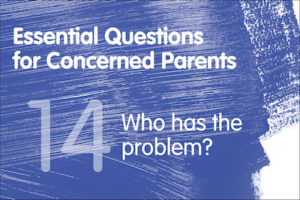 If your mate belittles your child and your child grows sad and withdrawn, your child certainly has a problem. But isn’t your mate the real problem?
If your mate belittles your child and your child grows sad and withdrawn, your child certainly has a problem. But isn’t your mate the real problem?
If you are highly anxious and vigilant and your child becomes highly anxious and vigilant, your child certainly has a problem. But what’s your part in the equation? If yours is a rigid and dogmatic household and your child rebels against your house rules, your child certainly has a problem. But isn’t the family’s rigidity its own sort of problem? I’m not raising this matter to assign blame or to make anyone feel guilty. Rather it’s a matter of appraising the situation honestly so that genuine answers can be found.
If your child is angry, isn’t it logical to ask, “Why is he angry?” rather than to announce “He has an anger problem!” If your child is despondent, isn’t it logical to ask, “Why is she so sad?” rather than to presume that she is something called “clinically depressed”? Your child may have no answers and indeed you may not have a great deal of luck getting at the why of the matter. But aren’t the twin questions “What might be causing this?” and “Who really has the problem” good starting points? You may be seeing the effect of some cause that, if identified, could be dealt with better. That’s a possibility worth exploring.
*****
Read the Concerned Parents’ Project Introductory Post
To get in touch or to share your feedback, please email us
Read more on this topic
Online Resources, Community Resources and You
Visit Parent Resources for additional in-depth articles














